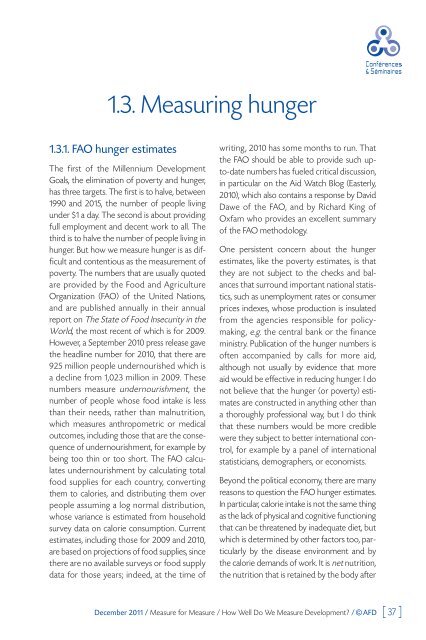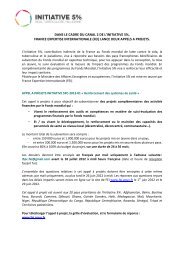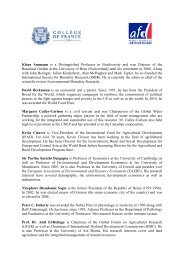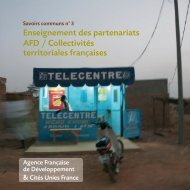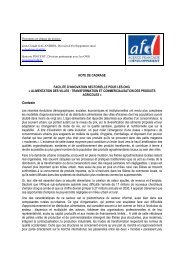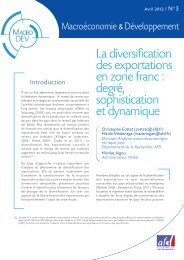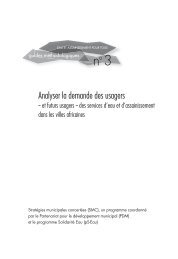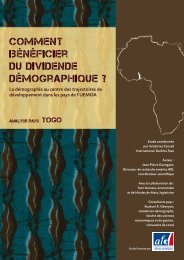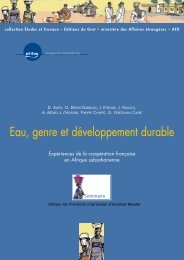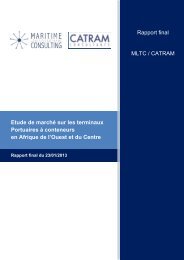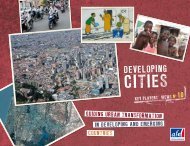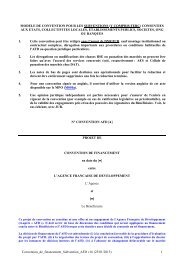Paris School of Economics - L'Agence Française de Développement
Paris School of Economics - L'Agence Française de Développement
Paris School of Economics - L'Agence Française de Développement
You also want an ePaper? Increase the reach of your titles
YUMPU automatically turns print PDFs into web optimized ePapers that Google loves.
1.3. Measuring hunger<br />
1.3.1. FAO hunger estimates<br />
The first <strong>of</strong> the Millennium Development<br />
Goals, the elimination <strong>of</strong> poverty and hunger,<br />
has three targets. The first is to halve, between<br />
1990 and 2015, the number <strong>of</strong> people living<br />
un<strong>de</strong>r $1 a day. The second is about providing<br />
full employment and <strong>de</strong>cent work to all. The<br />
third is to halve the number <strong>of</strong> people living in<br />
hunger. But how we measure hunger is as difficult<br />
and contentious as the measurement <strong>of</strong><br />
poverty. The numbers that are usually quoted<br />
are provi<strong>de</strong>d by the Food and Agriculture<br />
Organization (FAO) <strong>of</strong> the United Nations,<br />
and are published annually in their annual<br />
report on The State <strong>of</strong> Food Insecurity in the<br />
World, the most recent <strong>of</strong> which is for 2009.<br />
However, a September 2010 press release gave<br />
the headline number for 2010, that there are<br />
925 million people un<strong>de</strong>rnourished which is<br />
a <strong>de</strong>cline from 1,023 million in 2009. These<br />
numbers measure un<strong>de</strong>rnourishment, the<br />
number <strong>of</strong> people whose food intake is less<br />
than their needs, rather than malnutrition,<br />
which measures anthropometric or medical<br />
outcomes, including those that are the consequence<br />
<strong>of</strong> un<strong>de</strong>rnourishment, for example by<br />
being too thin or too short. The FAO calculates<br />
un<strong>de</strong>rnourishment by calculating total<br />
food supplies for each country, converting<br />
them to calories, and distributing them over<br />
people assuming a log normal distribution,<br />
whose variance is estimated from household<br />
survey data on calorie consumption. Current<br />
estimates, including those for 2009 and 2010,<br />
are based on projections <strong>of</strong> food supplies, since<br />
there are no available surveys or food supply<br />
data for those years; in<strong>de</strong>ed, at the time <strong>of</strong><br />
writing, 2010 has some months to run. That<br />
the FAO should be able to provi<strong>de</strong> such upto-date<br />
numbers has fueled critical discussion,<br />
in particular on the Aid Watch Blog (Easterly,<br />
2010), which also contains a response by David<br />
Dawe <strong>of</strong> the FAO, and by Richard King <strong>of</strong><br />
Oxfam who provi<strong>de</strong>s an excellent summary<br />
<strong>of</strong> the FAO methodology.<br />
One persistent concern about the hunger<br />
estimates, like the poverty estimates, is that<br />
they are not subject to the checks and balances<br />
that surround important national statistics,<br />
such as unemployment rates or consumer<br />
prices in<strong>de</strong>xes, whose production is insulated<br />
from the agencies responsible for policymaking,<br />
e.g. the central bank or the finance<br />
ministry. Publication <strong>of</strong> the hunger numbers is<br />
<strong>of</strong>ten accompanied by calls for more aid,<br />
although not usually by evi<strong>de</strong>nce that more<br />
aid would be effective in reducing hunger. I do<br />
not believe that the hunger (or poverty) estimates<br />
are constructed in anything other than<br />
a thoroughly pr<strong>of</strong>essional way, but I do think<br />
that these numbers would be more credible<br />
were they subject to better international control,<br />
for example by a panel <strong>of</strong> international<br />
statisticians, <strong>de</strong>mographers, or economists.<br />
Beyond the political economy, there are many<br />
reasons to question the FAO hunger estimates.<br />
In particular, calorie intake is not the same thing<br />
as the lack <strong>of</strong> physical and cognitive functioning<br />
that can be threatened by ina<strong>de</strong>quate diet, but<br />
which is <strong>de</strong>termined by other factors too, particularly<br />
by the disease environment and by<br />
the calorie <strong>de</strong>mands <strong>of</strong> work. It is net nutrition,<br />
the nutrition that is retained by the body after<br />
December 2011 / Measure for Measure / How Well Do We Measure Development? / © AFD [ 37 ]


